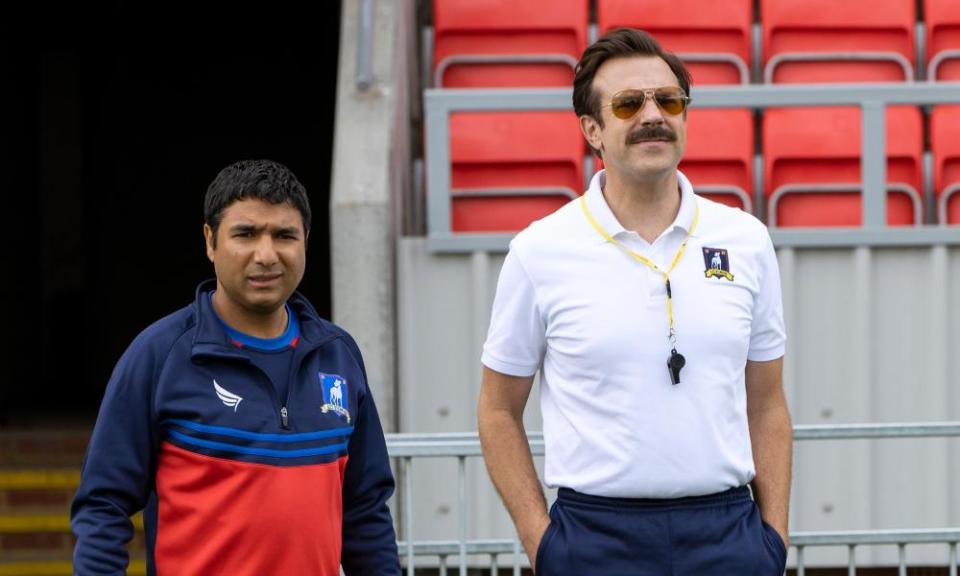A game of few laughs: can football and sitcom ever mix?

No sooner had the extended Premier League season ended than another footballing story started. You might not have noticed, but Apple TV’s culture-clash sitcom Ted Lasso, about an American NFL coach with no soccer experience taking over at a Premier League team, began over the weekend. It arrived to a pretty muted response.
It’s not the only footy sitcom we have seen this year. Inbetweeners writers Damon Beesley and Iain Morris’s disappointing The First Team had some distinctly lower-midtable reviews for the BBC. It’s something of a trend that, whenever the sit of the com is in a football club, the laughs are hard to find. Mike Bassett: Manager lasted a series, The Cup and Warren United have tried it too, but none of them quite worked.
Loads of good sitcoms have dipped into football, packing characters off to five-a-side tournaments and Sunday league kickabouts for a change of scene, but when the football club is the norm it seems that failure isn’t far behind. Do football and sitcom, two of Britain’s greatest loves, just not mix?
Perhaps the reason is in part that football already parodies itself extremely effectively, always half a yard ahead of what any sitcom writer could throw at it. It’s hard to outpace a business that routinely turns up moments such as the Leeds United manager, Marcelo Bielsa, sending a spy to hide in some bushes to watch Derby County train or the Crystal Palace’s goalkeeper Wayne Hennessey explaining an apparent Nazi salute by saying he didn’t know what Nazis were.
Most footballers disappear as soon as they leave the field while the big characters tend to be too extreme in retirement to satirise properly, as they exaggerate their most saleable aspects. Take Roy Keane: once a likable curmudgeon, his critiques of David de Gea now turn into violent fantasies of beating the goalkeeper to an insensible pulp. He used to just walk his dog at politically provocative moments; now, he is Sky’s very own Patrick Bateman.
That unreality is a lot for a footballing sitcom to encapsulate, as is the general lack of empathy for young millionaires. British sitcoms thrive on characters struggling against mundanity and the bleakness of their lives. The First Team really tried to make you feel for the players – they’re bored, passing the time playing Fifa, chucking thousands of pounds at horse races or being bantered into a submission by alpha hard men. Their fans are either raging monsters or selfie-hunting vultures. And yet, the whiff of privilege is hard to shake.
Despite the likes of Raheem Sterling and Marcus Rashford making positive contributions to recent political discourse, the popular idea of footballers as living in a totally consequence-free bubble is still there. Twitter is a cesspit, but the lack of empathy that leads people to hurl abuse into the comments of even the blandest post stems from the general belief that footballers are so well paid they are not allowed to have feelings.
Sitcoms work best with characters who are trapped together in some way: living in a Travel Tavern, floating through the void in a red space ship, or working with their colleagues at an underperforming paper merchants in Slough. Ideally, a setting starts to grind characters against each other. But footballers, at the top end of the game, live in a pretty frictionless world. When most fans’ only inside look at a modern football club is through ultra-glossy documentaries like those following Manchester City, Juventus, Leeds and Spurs, that’s perhaps understandable.
The worst that might happen is a Gareth Bale situation, where talent wastes away in the reserves for years, but a life of nearly endless leisure time and wealth isn’t the kind of comeuppance a sitcom demands. Wealth doesn’t stop anyone being unhappy or lonely or unhealthy, but it does take the edge of desperation away from a sitcom character, and generally it’s when characters get desperate that they start pitching Monkey Tennis.
The two really successful TV shows based around football dodged these pitfalls, and crucially weren’t comedies (not in the traditional sense anyway). The soapy vibe of Footballers’ Wives and the sheer hallucinatory madness of the later series of Dream Team – multiple coach explosions, captain shot by a sniper while lifting the FA Cup, goalkeeper taken out by a Swat team kidnapping his teammates – chimed a lot more closely with what you vaguely suspected the footballing world was like. It might not have been exactly reality – they were about as gritty as those empty branding exercises that pass for fly-on-the-wall documentaries – and definitely a lot more interesting than watching bored twentysomethings play Fortnite in a gigantic empty house.
That bombastic tone might be the only way for television to keep up with the whirling madness of top-flight football. After Ted Lasso and The First Team, the football sitcom feels like an idea that’s ready for retirement.

 Yahoo Sport
Yahoo Sport 





































